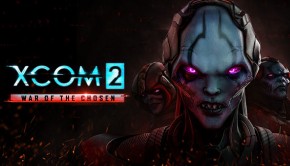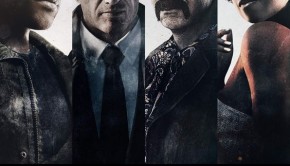Roland Rizzo Interview: Thirty Years in Game Audio
 For thirty years, Roland Rizzo has composed music and designed sound for video games for companies such as Coleco, MicroProse, and now Firaxis Games. During this time, he has worked on every instalment of the Civilization franchise, alongside franchises such as Spy Hunter, Magic the Gathering, and XCOM. Most recently, he led the audio for XCOM: Enemy Unknown, which generated enormous praise upon its release earlier this year.
For thirty years, Roland Rizzo has composed music and designed sound for video games for companies such as Coleco, MicroProse, and now Firaxis Games. During this time, he has worked on every instalment of the Civilization franchise, alongside franchises such as Spy Hunter, Magic the Gathering, and XCOM. Most recently, he led the audio for XCOM: Enemy Unknown, which generated enormous praise upon its release earlier this year.
In this interview, Roland Rizzo uses his years of experience to provide some valuable insights into game audio and its development. He places particular focus on the sound and music of XCOM: Enemy Unknown, noting how he paid homage to the original games while using today’s modern technology, and also reflects on why Firaxis Games is a great place to produce innovative games and soundtracks.
Interview Credits
Interview Subject: Roland Rizzo
Interviewer: Chris Greening
Editor: Chris Greening
Coordination: Chris Greening, Michael Curran
Interview Content
Chris: Roland Rizzo, it is an honour to talk to you today. During your thirty years in the games industry, you must have witnessed a lot of growth and changes in the games industry. Could you give your perspective on this? Are you inspired by how far things have developed or do you sometimes yearn for the classic days?
Roland Rizzo: Yes I’m inspired! When I started at Coleco, working on ColecoVision console and Adam computer games, the sound packages were hex data tables fed through Z80 assembler code to the sound chip. The average sound package size, for both music and sound effects, was 1.5K (that’s K for Kilobytes, not M for Megs or G for Gigs, but K!).
Nowadays, the quality is almost always CD level, and the quantity is vastly greater than what I could imagine back in 1983. And it has to be — today, games compete with all other entertainment, including movies. Where movies have to hold your attention for 1.5 to 3 hours, games have to hold a player’s attention for sometimes tens of hours and the sound package has to help hold that attention.

Chris: You have spent most of your time in the game’s industry with MicroProse Software and its spiritual successor Firaxis Games. What has inspired this incredible loyalty?
Roland Rizzo: Two things that have always been important to me is the type of work, and the people that I work with. At MicroProse, there was a great variety in the types and styles of games: WWII flight and land sims, modern war sims with F15s / A10s / M1 Abrams tanks, pirate games, fantasy games, Windows casual game packs, graphic adventures, a sports game, an FPS, and, of course, Civilization.
The Hunt Valley audio department was also the audio department for the North Carolina studio, and occasionally we helped the California and UK studios. There was a lot to do, but it was a wide range of things and it maintained your interest.
Now, the games are much larger and they take a lot more time to complete, so the variety is down, but the experiences are richer. I have also been fortunate that at both companies, there have been very talented and creative teams.
Chris: Is it true that there has always been a strong synergy between the game designers and audio team at MicroProse and Firaxis?
Roland Rizzo: The synergy between game design and audio evolved over time. It started with “we need these sounds and tunes” and off we’d go to work on the list. At that time, more often than not, the audio department was concurrently working on multiple titles, so that was fine. We would start with the lists and then augment them as development progressed and the need for more audio became evident.
As the games got bigger, the number of simultaneous titles went down, and the need for richer, more immersive audio environments became more important. It was necessary to become involved in the creative process much sooner.
Chris: Most recently, you served as sound director for the critically acclaimed XCOM: Enemy Unknown. You have said in an earlier interview that “I’m not trying to produce the same sounds, but the same feel” as the original games. Could you elaborate further on this? How did you achieve a similar mood for the game while using modern technology?
Roland Rizzo: When the original XCOM game debuted, PC audio quality was quite varied. You had to support systems with only the PC speaker as well as a number of soundcards with varying capabilities — some that were barely better than the sound chip in the ColecoVision console. A separate sound package was created for each soundcard (and the PC speaker), so that the better ones didn’t have to suffer from the restrictions of the lower quality cards. But the result was that a game could sound very different depending on the hardware in the PC. And even the best soundcard of that time pales in comparison to the hardware and software that is used to create game soundtracks today.
So there was never a thought of recreating any of the original sounds, but John Broomhall (the composer and sound designer of the original XCOM) nailed the mood and essence of XCOM and that’s what I wanted to recreate.
Chris: You supported the development of the original UFO: Enemy Unknown before taking leading roles on the X-COM: Interceptor and X-COM: Enforcer. How have your experiences on such projects helped you shape XCOM: Enemy Unknown‘s audio? Did you ever also influence the wider game design?
Roland Rizzo: The MicroProse, Hunt Valley audio department did help and support X-COM: Apocalypse, the third title in the franchise. But for the first two, I could best be described as an unofficial Beta tester — they were great games that I enjoyed playing even before they were finished. The first two were done entirely in the UK by John Broomhall, a very fine musician.
It was the feel that John created in the first two games that I wanted to capture in ours. That creepy, eerie, spooky feel to the tactical missions had to be right or you basically weren’t making XCOM — just another action/adventure Sci-Fi game. That being said, the game was being made for consoles as well as PCs.

An adaptive component was also important this time. When you engage the aliens, the soundtrack switches from the creepy and eerie to Michael McCann’s combat music, which is great! When the engagement is over, the music switches back to the creepy and eerie because you don’t know what’s going to happen next, or where — parts of the map could still be covered with the “Fog of War”.
Chris: While you handled much of the music production for XCOM: Enemy Unknown, you outsourced a number of tracks to Michael McCann and Tim Wynn. Can you explain why you selected these artists and what their key responsibilities were? What inspired the decision to commission McCann to produce a main theme for the score?
Roland Rizzo: Mike did all but one of the major tent pole (storytelling) cinematics, the combat music (when you engage the aliens during a tactical mission), and the base background pieces (one for each act) which play while you are in the ant-farm view. He was also responsible responsible for the main menu theme, which serves as the soundtrack’s main theme. Tim Wynn created the soundtracks for the tutorial cinematics and one of the major tent poles.
The list of composers considered for the game was fairly short and it became obvious, after listening to previous works, that Mike’s style was a perfect match and he would understand what we were trying to achieve.
Tim Wynn was a much appreciated last minute addition to the project. The tutorial was one of the final parts of the project to be worked on, which means it came at the most frenetic part of the development cycle. He was suggested to us by the 2K production team and he did an outstanding job.
Chris: Many of your own contributions to the score were ambient or diegetic. How do you feel such components enhance the in-game experience? Was it your intention to blur the distinction between music and sound design here?
Roland Rizzo: As I mentioned before, setting the correct creepy, suspenseful, eerie feel during tactical missions is what makes the game feel like XCOM. Making the tactical soundtracks atmospheric as opposed to melodic and rhythmic allowed everything happening on a map to blend into a coherent soundscape. In addition to the eerie soundtrack, there is a looping ambient track that is map-dependent as well as some map features that have their own sounds.
A bonus to this approach was that it allowed the pod reveal stings (short, creepy musical pieces that play when an alien group first appears) to blend with whichever soundtrack was playing at the time. This was important since for all but a few of the missions, the soundtrack is randomly selected at mission load.
Chris: In contrast to other games in the series, you presented a selection of music from XCOM: Enemy Unknown as part of a downloadable soundtrack release. What inspired this choice? Did you originally intend the music to be heard on a stand-alone basis or was your priority the contextual experience?
Roland Rizzo: My intent was always contextual. The players should feel immersed in the environment of the game space; the sound package must help to enhance the overall experience.
The game itself is setup in three acts. When the idea for a soundtrack release was presented, that’s the format I followed. I selected representative pieces from each of the acts, so that the soundtrack release is a snapshot of the flow of the game.

Chris: Beyond X-COM, you have worked on every addition to the Civilization franchise, spanning the original game from 1991 to Civilization V in 2010. What are the key similarities and differences when working on the audio for the two franchises? While the Civilization franchise is very different from XCOM, it has continuously built on the same principles since its inception, leading to the incredible well-realised, detailed audio of Civilization V. Have you been satisfied with the way the series has progressed?
Roland Rizzo: The key similarity between both series is the importance of the soundscape (which includes the soundtracks) to the gameplay.
Civilization has the interesting challenge of having one large map. The environmental ambiences have to constantly change, flow, and blend as you move around the map. The map soundtracks are very musical (in comparison to XCOM), but they reflect culture, or world region as well as era. So they are also very important to the overall soundscape.
Civilization is a composer’s dream game. There are so many different cultures with their own unique styles of music that you are constantly writing something different, but as equally interesting as your last piece. The audio has progressed from whatever “beeps and boops” a soundcard could produce, to fully realized arrangements recorded by live orchestras — the audio has definitely kept pace with the ever maturing gameplay.
Chris: Both Civilization V and XCOM: Enemy Unknown are incredibly detailed in the audio department, whether the musical pieces, sound effects, voice recordings, or interactive playback. As a sound director, how do you achieve such detail while considering the bigger picture? Does it ever get overwhelming, and how does it feel to complete the project?
Roland Rizzo: The big picture, whether you’re in the strategy or tactical layer, always takes precedence. In XCOM: Enemy Unknown, for example, the Sectopod is considered the “badass” of the alien characters (even though I dislike the Chryssalids more). On screen, the Sectopod is roughly only twice the height and width of a human soldier. So you have to keep the leanings toward “grandeur” and excess in proportion to what you are seeing.
For much (around 75%) of the development cycle, I worked on the game alone — all the sound effects, music, speech, and cinematics. Even the placeholder soldier chatter used my voice for a while. So yes, at times it felt overwhelming — it’s a big game — but the result of the finished game was definitely worth the effort.
Chris: Looking back at your video game career over the last thirty years, there have been a lot of highlights. What innovations and achievements are you most proud of? On the contrary, were there any memorable low points?
Roland Rizzo: I would have to say that the most important innovations were in the area of hardware. As PCs, consoles and sound hardware improved, sound designers and composers could better achieve the quality that they heard in their heads, but couldn’t realize in their work.
Thirty years encompasses a lot of titles, so here’s just a few of the ones I enjoyed: Spy Hunter for the ColecoVision, Sid Meier’s Magic the Gathering, Civilization II, Civilization V, and, of course, XCOM: Enemy Unknown.
There weren’t any real low points, but I do remember certain projects in the early days (during the multiple, concurrent development periods) that I felt didn’t get the time or effort that they deserved.

Chris: Both Civilization and XCOM will hopefully receive new instalments in the future. What features would you like to see maintained in their audio? What room is there for future development and improvement?
Roland Rizzo: Both Civ and XCOM come with expectations of quality and a certain style. Maintaining that in the context of whatever the new game design and game play experiences may be, has always been our primary focus with each new release. I should also mention that XCOM: Enemy Unknown used the basic, stock audio capabilities of the Unreal engine. Since that engine is tailored more towards first person shooters, there were some effects that couldn’t be realized as I imagined them.
Chris: Many thanks for all your time today, Roland Rizzo. Is there anything else you’d like to say? Do you have any message to fans of XCOM and Civilization around the world?
Roland Rizzo: The XCOM and Civ development teams are as enthusiastic about these games as are the fans. Expect more good things in the future!
XCOM: Enemy Unknown is currently available at a discounted rate on Steam. Readers interested in learning more about the sound and music of the Civilization franchise should check out our interview with Michael Curran and Geoff Knorr published last year.
Posted on December 25, 2012 by Chris Greening. Last modified on April 14, 2014.














